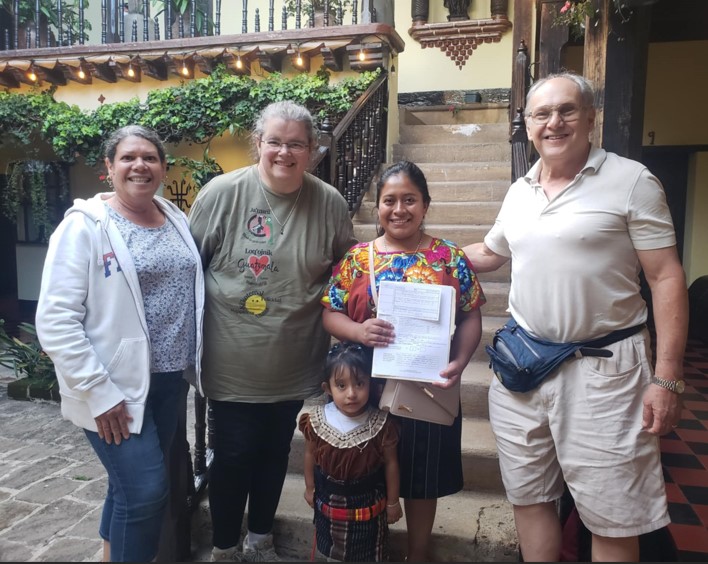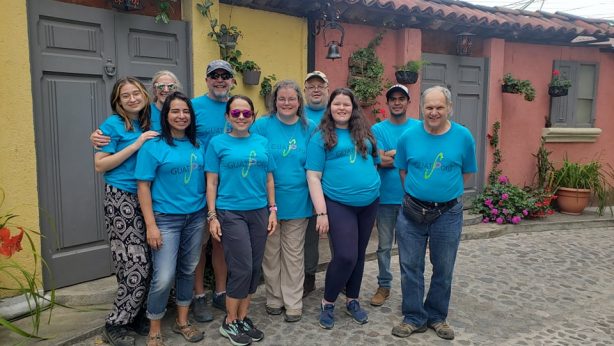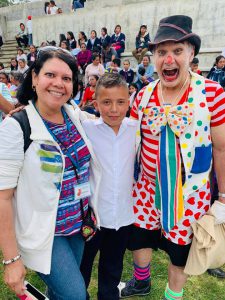Remarkably Unremarkable (still)

A few years ago, I went on a journey where I visited a few friends, made some new ones, attended a birthday party, did a little shopping in an open market, stayed in a couple of hotels, visited a school, and ate out in a restaurant or two. A few months later, I posted on Facebook about that trip, calling it “remarkably/unremarkable.” The unremarkable part I mentioned above. What made it “remarkable” was that it happened in the fall of 2020, when Covid was still raging, there wasn’t a vaccine yet, and very few people were traveling anywhere, especially not to Guatemala, which was my destination. It was my first trip with Guatemala Service Projects, and as a newly appointed member of the board, it was quite an experience to get to see, in person, what we do, and who we do it for.
On my next two trips we visited even more destinations where it was evident how profoundly the organization had changed the lives of so many people. My friendship with Jen grew stronger, and I gained a greater understanding of all the roadblocks she (as well as Trent and Jen Scratch) had to go through, just to get the nonprofit started. It just deepened my appreciation for all that had been accomplished by the organization, and it inspired me to write a blog. Continuing the theme, I entitled it “Remarkably Unremarkable.”
I have been back to Guatemala three more times since then, fortunate enough to have had my wife Lillian and son Andrew accompany me on all of them. Just like the others, on the surface, our adventures appear to be “unremarkable.” Fortunately the horrific complications of Covid are now a thing of the past, but that hasn’t made our experiences, nor the people we have met, any less “remarkable.” I would like to share some of those experiences with you, as well as introduce you to some of those people.
Karla, Her Family, and Her Chickens
I will start with my friend Karla who I first met in 2020, along with her family, when she was 9 years old. Whereas now I would describe her household as somewhat typical to many of the families we visited, at the time, I considered it anything but. It was my first experience walking down a narrow, dirt path into a thick forest, into what seemed to be the middle of nowhere, just to get to her home, built like structures I had only seen in the pictures in history books which depicted what life was like hundreds of years ago.
The purpose of our visit that day was to deliver four chickens and a rooster to her family, as part of the “10 Bucks a Cluck” program. Her family appeared to be perfect candidates for the program, and they had already established a thriving business selling beautiful hand woven tapestries, and Karla, a student in our scholarship program, was receiving excellent grades in school. I handed her one of the chickens myself and there are even photos and videos to prove it. We reunited with Karla on our recent visit, when she and her family attended a ceremony arranged by GSP at her school, to give awards to those students whose families had the largest harvests that were products of our seed program.


She is now a beautiful 13 year old, growing into the mature, poised woman I knew, from that first meeting, she is destined to become. Our confidence in her family was confirmed. She said that they now have 15 chickens. This news was truly astounding because we had heard stories that some of the families had been unsuccessful in raising the chickens due to disease and predators. We didn’t get a chance to find out exactly how many eggs the chickens produce, or how Karla’s family is using them, but I have no doubt that what they are doing is…”remarkable.”
P-Bajo, a “Rich” Community
The next day, we visited a place called Panimaché Quinto Bajo, or as I like to call it P-Bajo. We have visited this community several times in the past, and among the “unremarkable” activities we engaged in was sharing a meal prepared by the residents to show their appreciation for our contributions, and playing soccer with the children. It is only possible to appreciate how “remarkable” these endeavors are by seeing pictures of the soccer “field” and the kitchens that they used to cook the food.
But to truly illustrate how “remarkable” P-Bajo is, I will relate an incident which occurred on a previous trip. One of the projects that the nonprofit provided for P-Bajo was funding of an onsite medical clinic. On the day of our visit, we were following the 12-wheel, forty-foot flatbed truck which was delivering concrete blocks for the walls and floors.
Once you leave the paved road, the path to get to P-Bajo is long, and as steep and treacherous as a roller coaster. It is so narrow that when two cars meet traveling in opposite directions, one must back up until there is a shoulder large enough to move into and let the other pass. Drivers must carefully maneuver their vehicles to keep the wheels on two strips of pavement, just slightly wider than the tires, or else risk having them shredded by the sharp edges, and the impact of dropping several inches onto the dirt road can result in the rims becoming mangled, probably beyond repair.


About two-thirds of the way down that’s exactly what happened to the truck, resulting in two flat tires and rims that were bent inoperably from further use. We got out of the van and walked the rest of the way. It wasn’t all that difficult for us. I can’t say the same for the men from P-Bajo who had to walk up to the truck and carry the concrete blocks back to their village, repeating the task 50 times each. When I was first informed as to what had occurred, I remember thinking that we might have to sleep in the van that night, because it seemed impossible to move the truck at all in less than a day, and there was no way our van could either get around it, nor back up. With the help of those “remarkable” people, the truck drove away in about two hours.
The main purpose of our most recent trip was to deliver solar powered lamps to all the families in the community. They were provided by James Sutton who with the assistance and support of his parents, created the project to achieve the designation of Eagle Boy Scout. A simple “unremarkable” string of LED lights, attached to a solar panel about the size of an iPad, which, I am sure will enable the families to read or sew after dark. While I am not so sure they are all so enthusiastic about it, the children are now able to do their homework after the sun goes down. The expressions on the men’s and women’s faces tells you all you need to know, to realize how “remarkable” an impact this simple device will have on their lives.


A brief and simple experience of my own, resulted in a “remarkably” touching moment for me. During previous visits, not only did I play soccer with some of the children, but made balloon animals for many of them. I also had briefly addressed both the men and women to express how the words “We are rich,” had been so inspiring to me, when I heard a member of their community use them to describe how they see themselves.
As Jen can tell you, I do have a tendency to “wear my heart on my sleeve,” and this occasion was no exception. Some of the men and women chuckled as I am sure it was so unusual for them to see someone, especially a man, display his emotions so publicly. I guess my tears and balloon sculpturing skills left an impression, because on this visit, several of the men remembered me, and addressed me as Mike. This time I was able to keep my emotions in check when I shook their hands.
Kitchens and Bathrooms
For anyone who owns a house or a condominium, there is nothing “remarkable” about renovating a bathroom or kitchen. We get tired of having to deal with a persistent drip from a faucet, or a toilet that keeps running. We may decide that the medicine chest or vanity left by the previous owners just isn’t “right” for us. When a major appliance like the refrigerator breaks down, it provides a reason to give the kitchen a complete makeover, new sinks, stoves, dishwashers, and cabinets.
Replacements can be found at a nearby Home Depot or Lowes, and usually delivered in a day or two. To get the work done, if we don’t know someone who can reliably do it a friend or relative can provide a name. My dad taught me enough about plumbing so that I have been able to perform some “DIY” projects such as fix and replace faucets, as well as repair a few toilets. I wouldn’t call that “remarkable.”
In Guatemala, renovating a kitchen or a bathroom, especially in a school IS pretty “remarkable.” Schools in Guatemala, especially those in the remote communities we service, are provided with very little assistance from the government to fix and replace kitchen and bathroom facilities. Most of the families have difficulty finding the resources to supply their children with the clothes, books, and supplies they need for their children to attend these schools, so it is virtually impossible for the schools to raise the money through community contributions.
As a result, in several of the schools we visited, the pipes and plumbing fixtures in the bathrooms were so corroded that barrels of water were used for the kids and faculty to wash their hands and flush toilets. In the kitchens, we saw large buckets positioned under the huge cracks in the “pilas” used to wash the dishes. Without them, the floors would become covered in deep puddles. The wood burning stoves were poorly vented and crumbling, which created both a fire hazard, and endangerment to the health of the workers because of the smoke inhalation.


The “unremarkable” donations from our supporters, no matter how small, added together, paid for the “remarkable” bathroom and kitchen facilities that exist today. The administrators, staff, and students expressed their gratitude by welcoming us with warm embraces and smiles. They also bestowed us with gifts, shared meals, and the children proudly performed songs and dances. While I am not going to deny that I enjoyed the celebrations and attention, I am sure I speak for everyone who contributed when I say that just seeing how “remarkably” their lives have changed, would have been enough.
Running Water
There is nothing “remarkable “about turning on a faucet to get water, unless you live in many of the communities that I have visited on my journeys with the nonprofit. Some households collect rain water in large tanks and barrels, others make multiple trips every day, carrying heavy buckets that were filled from a nearby stream or river, that may be at the bottom of a steep hill, several football fields away. They then must boil out the pollutants, to make it safe to drink. Through our donations, Guatemala Service Projects provides water filters to many families, so at least that last step can be eliminated. In communities that are lucky to have an accessible water source, we have contributed to projects which does provide clean, running water in their homes.
Cantón Patzibal already had a community water system, but because of limited resources, had used PVC pipes which, while cheaper, weren’t as strong as the metal pipes that were more resistant to the weather conditions that cause them to deteriorate. Due to multiple leaks, they sometimes had to go several days without any water, because the pressure wasn’t strong enough to reach the homes.


The water committee invited us to celebrate the replacement of the pipes, which our contributions had provided. They shared with us a delicious meal of chicken stew which is the national dish of Guatemala. There were also prayers and speeches to express their gratitude, and in her own emotional speech, Jen expressed how happy she was that we could assist them, stating “Water is life.” The event culminated with a turn of the faucet, and to loud applause, watching the water flow freely into the sink. This is when it becomes “remarkable.”
Making a New Friend
Throughout the week, I was able to repeatedly perform my favorite “task” which is making balloon animals mostly for children, (but occasionally an adult or two). On this trip, I had a very memorable encounter while making one for Valeria, who is a very precocious three year old. She is the daughter of Kimberly, our newest participant in the entrepreneur program. Kimberly was hoping to purchase additional merchandise to expand her women’s clothing and accessories business, and Guatemala Service Projects was able to provide the funding.
When she and her husband Armando came to our hotel to receive the donation, they brought along Valeria who was wearing the traditional multi-colored dress, which you see on so many girls in Guatemala, and, to me, make them look like beautiful, life-sized dolls. When I blow up and sculpture the balloons for large groups of kids, I barely have time to even ask them their names, so I especially enjoy when there is just one or two, giving me a chance to briefly interact.

As usually happens, Valeria was initially shy, so I quietly sat next to her, took a balloon out from my bag, and smiled each time we would make eye contact. When I finished making a little poodle, I asked her to assist me in performing the “final touch” where by blowing on the tip of the tail, a little bubble “magically” appears. This almost always results in me being able to elicit a surprised giggle, and Valeria was no exception.
While her parents were in discussion with Jen, it gave me a chance to have a conversation with Valeria. Actually, she did most of the talking, telling me about her life and family, only some of which Lillian was able to translate into English for me to understand, but the one question she did ask, which produced a big laugh was “What happened to your hair?” Jen told me the other day that she had been in contact with Kimberly, who updated on the progress her business is making, and also said that Valeria wanted to thank me for making her the balloon dog, and “hopes to see ‘Mayck’ again, with his balloons next year.” The misspelling of my name makes the memory of my encounter with her even more delightful, and “remarkable.”
Well, that’s About It
I have now written my longest blog yet, and there are still so many “remarkable” adventures and memories I haven’t told you about. There was Lillian and my impromptu “English lesson” with the students at Cantón Río Camanibal, when they would loudly giggle when hearing how their names were pronounced in English, the welcoming hug I received from the principal at EORM Cantón Xabillaguach, who on our previous visit I told that she couldn’t be any older than 25, the “job offer” I received from the administrators at Colegio Alfa y Omega, or the in-person game of Uno we played with students who normally attend the weekly online English class that we support, and is led by a student from our scholarship program.
I guess if I am going to relate these stories, and so many more, I will have to write a book. If and when I do, I will OBVIOUSLY title it “Remarkably Unremarkable.”


 The “right” opportunity arose when I learned about a travel opportunity for adoptive families which would include volunteer work and cultural sightseeing. Being members of that team had a profound impact on me, Lillian and Andrew. Not only were we able to make a real connection to our son’s birthplace, but we met incredibly warm and generous people, all of whom we now consider to be a part of our “family.” In addition to the volunteer work I shared with the Team, I also was able to “give back” by performing as my alter ego, “Farfel the Clown” at a barbecue for children of The Backyard School. It will remain one the proudest and happiest memories of my life.
The “right” opportunity arose when I learned about a travel opportunity for adoptive families which would include volunteer work and cultural sightseeing. Being members of that team had a profound impact on me, Lillian and Andrew. Not only were we able to make a real connection to our son’s birthplace, but we met incredibly warm and generous people, all of whom we now consider to be a part of our “family.” In addition to the volunteer work I shared with the Team, I also was able to “give back” by performing as my alter ego, “Farfel the Clown” at a barbecue for children of The Backyard School. It will remain one the proudest and happiest memories of my life.